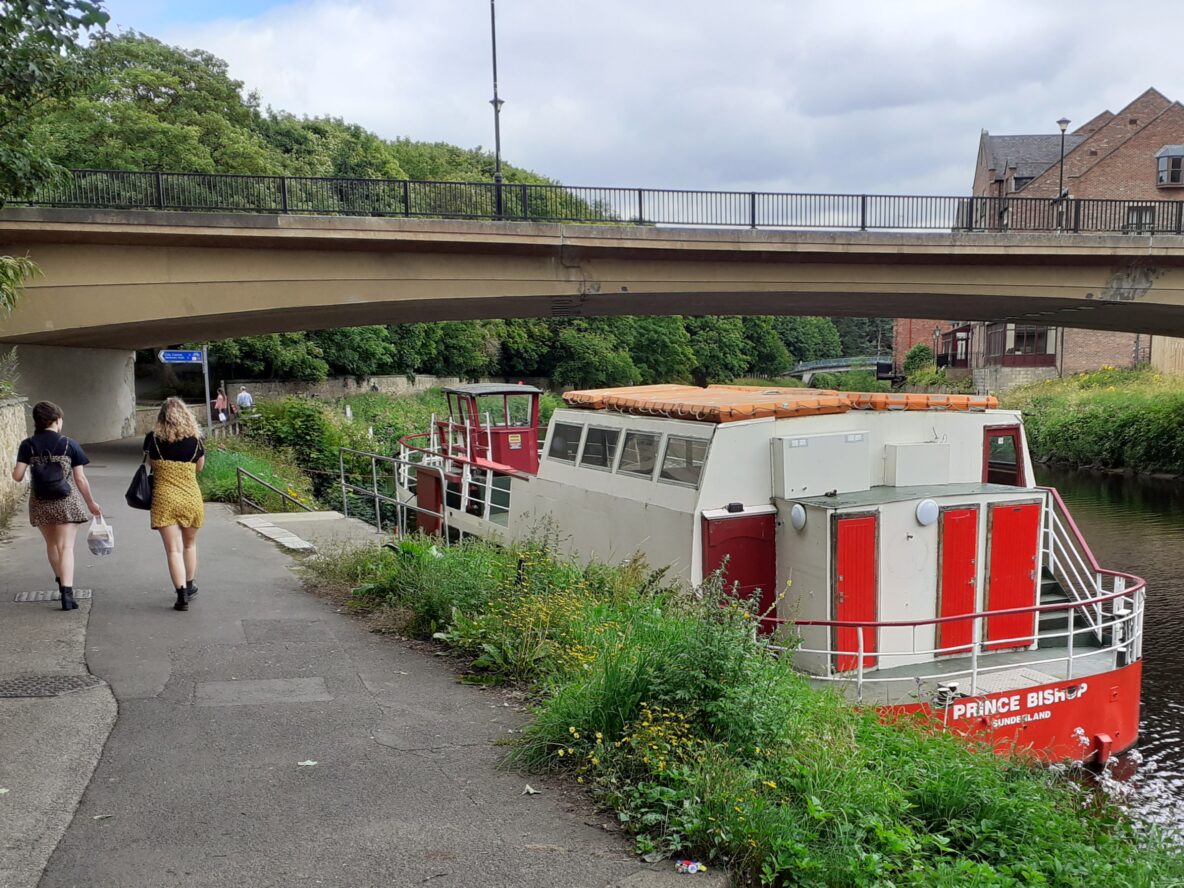After a frustrating season of challenges that continue to mount we look forward with some trepidation to the 188th Durham Regatta, set to take place on June 12th and 13th 2021.
Added to enforced restrictions on rowing and the loss of all summer competition due to the Covid-19 pandemic, the situation is further exacerbated by the closure of New Elvet Bridge for repair from July 20th for 14 months and the continuing need to dredge the river, not to mention uncertainty surrounding numerous construction projects ongoing and planned in the city, as well as changes to the University estate and the relocation of student accommodation. This uncertainty makes planning for next year’s Regatta, if indeed there is to be one, increasingly difficult, not least the management of access to the site for competitors, spectators, traders, entertainers, officials and volunteers, and as such the planning that in normal circumstances would now be underway has been put on hold. A third successive cancellation would be unthinkable but may be unavoidable.
As well as providing the Regatta course the River Wear is the city’s central artery, acknowledged by locals and visitors alike as one of its major attractions, and in particular draws together city and University in harmony. The lockdown and the absence of most of the student population since March has seen it in suspended animation since the onset of the pandemic, allowing nature to return to the new tranquility.
The rowing part of the Regatta depends on unhampered access to 1800 metres of the river while the adjoining Racecourse and Enclosure accommodate bankside entertainment for thousands over the weekend. As the planned bridge works will bisect the long course at its midpoint. any restrictions of passage under the bridge will remove the possibility of including prestigious events, such as the Grand Challenge Cup and Wharton Challenge Cup, raced traditionally over the long course.
Regatta officials are in contact with Durham County Council regarding the nature and timing of restrictions on river traffic and are awaiting feedback. Although careful planning enabled the 1973 Regatta to go ahead during construction work prior to the new bridge opening in 1975, volumes of road and river traffic at that time were much less than current levels. The construction of Milburngate Bridge (1967) and New Elvet Bridge was part of a scheme to avoid traffic having to go through Durham’s Market Place. The loss of the road crossing will seal off a major access route to the Racecourse and introduce lengthy diversions for visitors, boat trailers etc. Any changes to the traditional format would be subject to financial viability.
Any restrictions on the passage of boats along the river will create a division between clubs based on the upstream and downstream sides of the bridge, thus preventing boats from below Elvet Bridge from being rowed up to the start or back from the finish of races. With the bridge so close to the finish line the space required for boats to turn round and return upstream after racing will also be insufficient.

Riverside footpath closure
A river closure will cause similar disruption for all other rowing competitions on the River Wear, and for those training for them and their coaches. Coaches in particular will be inconvenienced by diversions enforced for cyclists.
Sedimentation has been an issue for many years. Although a survey of the river carried out recently by JBA Consultants was positive in terms of the ability for dredging to take place subject to permission from the Environment Agency, sources of funding will first need to be identified before any work can commence. The likelihood of events taking place will impact on the timing of work and availability of funding, which is likely to be scarce in a climate of more pressing priorities. The riparian survey report proposes that a capital dredge is possible as an extension of the 2010 Gravel Management Plan, allowing sediment to be relocated to deeper sections of the river, or in the case of non-toxic material, removed and disposed of to a suitable external site. Any sediment removal or vegetation clearance will need to be carried out during February/March to avoid disturbing habitats for breeding birds and other species.
It is anticipated that any presentation of the Regatta’s impressive collection of historic trophies to winners will be impossible within social distancing limitations, with the venue at the Gala Theatre already closed until January 2021, and audience sizes expected to be severely restricted thereafter.
A similar situation will apply to the ability to accommodate activities and spectators in the riverside enclosure, an integral part of any Regatta, under Covid-19 restrictions.
Social distancing restrictions have led already to the Prince Bishop River Cruiser being unable to operate this year. The bridge closure will now extend any possibility of a return to service until at least the end of 2021.
A walk along the riverbank gives an insight into the degree of engagement that rowing offers as a sport to schools, colleges, the University and local residents, with 15 boathouses serving 20 British Rowing affiliated clubs along the 3km of river between the weir and Maiden Castle, as well as Brown’s Boats providing recreation for locals and visitors.
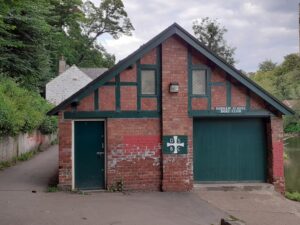
Durham School Boathouse
Durham School Boat Club is one of Durham Regatta’s founding members and was formed in 1847, although there was rowing at the school before then. The present boathouse was built in 1892. Rowers from the club have represented their countries nationally and internationally and many alumni have remained involved with rowing throughout life.
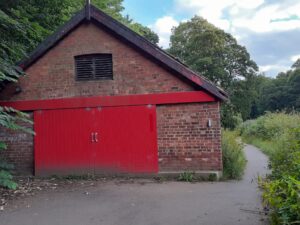
University College Boathouse
University College Boat Club dates from 1834 and is the College’s largest society as well as the oldest college boat club and the oldest in the north of England, having enjoyed much racing success in the 19th century. University College Boathouse was constructed in the 1880s and is now shared with St Aidan’s College Boat Club.
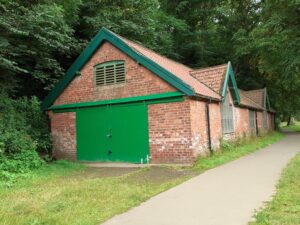
St Leonard’s School Boathouse
The boathouse now used by St Leonards School Boat Club was the former home of Durham Amateur Rowing Club until DARC moved to its present site at Green Lane in 1969. St. Leonard’s Boat Club was established in 1970 by Bill Parker, at the time a woodwork teacher at St. Leonard’s Catholic School and member of Durham ARC. Bill had previously introduced rowing to Consett Grammar School who hired the facilities at the clubhouse. St. Leonard’s BC then took over the vacant boathouse. Bill was later to complete a distinguished coaching career at Durham ARC.
The landing stage between University College and St. Leonard’s boathouses was constructed in 1959 and is shared between the two, after the earlier UCBC landing stage which was too close to the weir had been filled in.
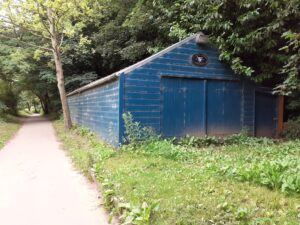
St John’s College Boathouse
St. John’s College BC was founded in 1909. Although St. John’s is one of the University’s smallest Colleges its Boat Club enjoys one of the larger memberships.
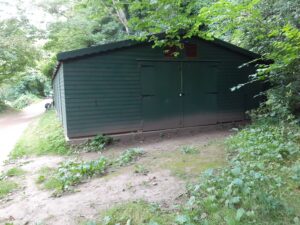
St Chad’s College Boathouse
The St Chad’s College Boathouse is shared between St Chad’s College Boat Club and St Mary’s College Boat Club. St. Chad’s College was formed in 1902. Former Durham Regatta Chairman Eric Halladay was Principal of the College between 1991 and 1994 after serving as Master of Grey College.
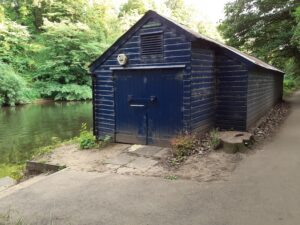
Van Mildert College Boathouse
Van Mildert College Boat Club was founded in 1965. The boathouse stands opposite Dunelm House.
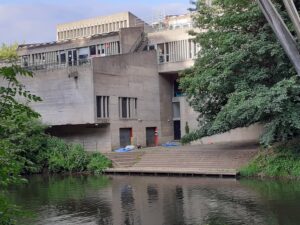
Dunelm House
Grey College Boat Club shares the Dunelm House boathouse and landing stage with Josephine Butler College Boat Club.
Eric Halladay, who was Vice Master (1967-80) and Master (1980-89) of Grey College, was Chairman of Durham Regatta between 1982 and 1988 and Head Coach of Durham University Boat Club (DUBC), before becoming a Steward of Henley Royal Regatta in 1993. Josephine Butler College is one of the University’s newest colleges, opening in 2006.
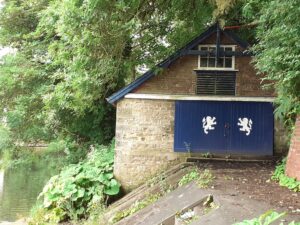
Hatfield College Boathouse
The last boathouse before Elvet Bridge belongs to Hatfield College Boat Club which was formed in 1846.
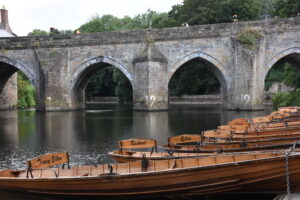
Brown’s Boats
Brown’s Boats is a long established family business and has been building and repairing boats in Durham for well over 100 years, including many fine wooden racing boats. From the end of the second World War until the death of J Erik Brown (the third generation of the family to run the business) in 1975 efforts shifted mainly to the pleasure boat business which continues today.
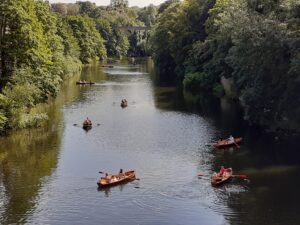
Brown’s Boats on a summer day below Elvet Bridge
Erik Whiteley (a member of the Durham Regatta Committee for 20 years) took over the business in the 1970s and the building of fine racing boats for local rowing clubs resumed.
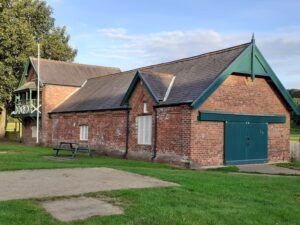
St Cuthbert’s Society Boathouse
St Cuthbert’s Society Boat Club (SCSBC) stands next to the University cricket field and is one of the oldest and most distinguished of the collegiate Boat Clubs, having been founded in 1893. The boathouse is a grade 2 listed building and is the only 2-storey boathouse in Durham, the elevated balcony affording an excellent view of the regatta course. Former Durham Regatta Chairman Bernard Robertson was Principal of St. Cuthbert’s Society from 1999 to 2001 as well as coaching SCSBC for many years and being Captain of Durham ARC from 1983 to 1989.
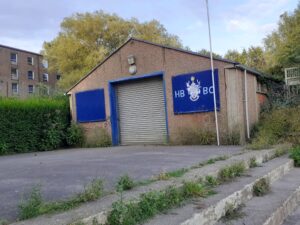
St Hild and St Bede College Boathouse
St Hild and St Bede College Boat Club was formed from the amalgamation in 1975 of Bede College (founded 1838) and St Hild’s College (founded 1856). Until the amalgamation St Hild’s accommodated only female students and Bede only male students, Collingwood College having become the University’s first co-educational college in 1973. The 2014 Durham Regatta prizegiving took place at the Hild/Bede’s Caedmon Hall.
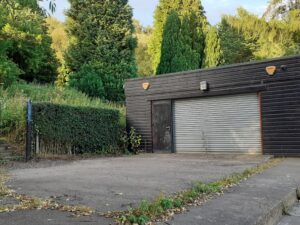
Collingwood College Boathouse
Collingwood College Boat Club is one of the largest of the University’s clubs. It took over the boathouse formerly used by St Hild’s College.
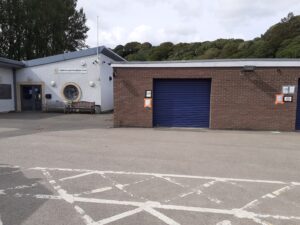
City Boathouse, Durham Amateur Rowing Club
Established in 1860 Durham Amateur Rowing Club (DARC) originally leased facilities from University College Boat Club before a new boathouse near the weir was built in 1897. This was later taken over by St. Leonard’s School when DARC moved to its current site. The new premises officially opened in 1971. The project to extend the boathouse and clubhouse was completed in 2007. The extension of the club’s landing stage in 2016 was part funded by Durham Regatta. The City Boathouse is the registered address of Durham Regatta.
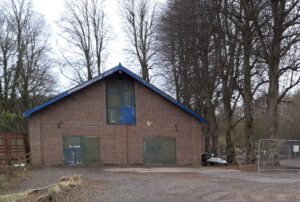
Old Coalyard Boathouse
Trevelyan College Boat Club boats from Brown’s Old Coalyard Boathouse.
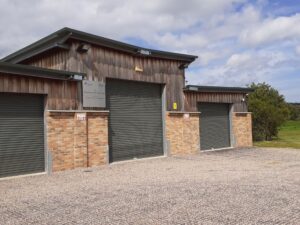
Robert Gillespie Boathouse, Durham University Boat Club
The Durham University Sports and Wellbeing Park at Maiden Castle reopened in 2019 after a £32 million extension and refurbishment. It includes the site of the Robert Gillespie Boathouse, which houses much of the Durham University Boat Club (DUBC) fleet, and the Sophie Hosking Rowing Tank, although much of DUBC’s training now takes place on the less congested River Tyne.
Robert Gillespie is a 1977 Durham University graduate and was elected Chairman of the Boat Race Company in 2009, having previously run the Women’s Boat Race at Henley for several years. He is the first non-Oxbridge graduate to take charge, and played a major role in bringing together the men’s and women’s Boat Races so that since 2015 both have been raced on the Tideway on the same day. A Durham Economics graduate he is also a non-executive Director of RBS Group.
Sophie Hosking graduated in Chemistry and Physics from Durham University in 2007 and was a gold medallist with Kat Copeland in the Women’s Lightweight Double Sculls at the 2012 London Olympics. The Sophie Hosking Rowing Tank opened in November 2012.
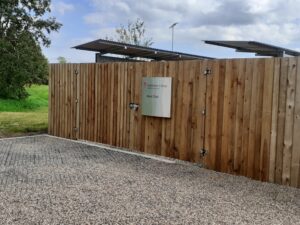
Stephenson College Boat Club
Stephenson College is one of two to relocate from Durham University’s former Stockton Campus, moving to the Howlands Farm site in Durham in 2018. Stephenson College Boat Club is housed at a building next to the Robert Gillespie Boathouse.
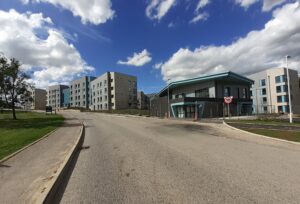
South College awaits its first students
Following a transition year at the Rushford Court site (previously Durham County Hospital) the other former Stockton college, John Snow College will move to its new location at Mount Oswald at the start of the 2020/21 academic year, the site being adjacent to that of the brand new South College, also due to open in October 2020. Prior to relocating the Boat Clubs of Stephenson and John Snow Colleges trained on the River Tees.
The Chorister School Boat Club also boats from the Maiden Castle complex.

Milburngate under construction
Among planned developments along the riverbanks is a new Durham University Business School on the site of the former swimming baths next to Baths Bridge. The date of construction is yet to be announced. Meanwhile construction continues further downstream at the new Milburngate site and the County Council HQ at Freeman’s Quay.
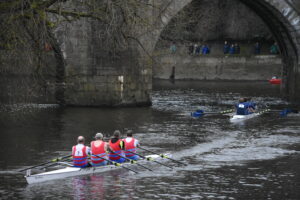
Durham ARC follow Chester-le-Street through Elvet Bridge at Durham Small Boats Head in 2018
Student numbers have increased rapidly over recent years, from under 5000 in 1987 to now stand at over 19000, each assigned to one of 17 colleges. Durham College Rowing (DCR) represents the interests of all the college boat clubs and is represented on the Durham University Rowing Board. Each June Durham Regatta is a highlight of the racing calendar for Durham College Rowing crews as well as being supported by Durham University Boat Club. College crews account for a significant proportion of entries. Although DUBC focuses more on national competitions there is a very active inter-collegiate racing calendar on the River Wear which includes the Novice Cup, Senate Cup and Admiral’s Regatta. Colleges regularly provide around 15% of the entries for City events organized by Durham Amateur Rowing Club, including Durham Small Boats Head in February, Durham City Regatta in May and Durham Autumn Small Boats Head in November, the two head races being contested over the long course in the upstream direction.
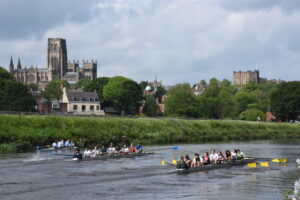
St John’s College take on Van Mildert at the 2019 Admiral’s Regatta
DUBC members and members of DCR college Boat Clubs make up over 30% of British Rowing (the National Governing Body) members in the Northern Region (as of February 2020), where around 40% of all members in the region fall into the 19-24 age range. Figures relate to those registered as racing members. Recreational members based in colleges but not affiliated to British Rowing will further inflate the statistic. The intake of freshers each year attracts large numbers to take up the sport with typically around 500 joining learn to row courses each autumn. School and Club rowers are also very active at Junior and Masters levels.
From this it can be seen that fluctuations in the numbers of Durham students and levels of Boat Club memberships will have a significant impact on competition entries. British Rowing statistics indicate a 31% fall in membership numbers in the Northern region between July 2019 and July 2020 as a result of the pandemic, although a recovery is expected once racing is resumed.
Durham Regatta relies heavily on the student entry as support from masters rowers in recent years has been limited due to the British Rowing Masters Regatta being scheduled at Nottingham on the same weekend, a situation expected to continue.
Of necessity College rowers have focused on fours and eights competitions as these are the boat types available in their fleets. Any restrictions imposed on boat size as a result of social distancing would make this unfeasible. To date British Rowing guidance has allowed single sculling to take place since May, with limited numbers of doubles and pairs able to take to the water from August, but the reintroduction of bigger boats has been slow to take off, perhaps because of the need for coxes to wear protective equipment. A regatta for singles and doubles/pairs would attract fewer entries and have limited appeal.
With colleges deserted, boathouses securely locked and many businesses in the city struggling to survive, the return of the student population in October from an enforced 6 month break, and a successful reintegration for the Michaelmas term will be a critical factor. The University has announced plans for a blended form of delivery with face to face tuition resuming in small groups for those able to return to Durham, in combination with online tuition for those unable to return.
As well as being unable to train in crews since last winter junior rowers in clubs and schools will need to adjust to the return of schools for the autumn term in September. This along with the ending of the Government’s Coronavirus Job Retention furlough scheme in October will be a focus of attention over the coming months. Safety will be of paramount importance.
The absence of a Regatta since 2018 makes it an unknown quantity for many and the appeal of rowing as a sport to prospective new members remains to be seen. The 2018 Regatta certainly attracted much acclaim.
A return to competition generally looks some way off and British Rowing’s proposed plan first needs approval from the Department for Digital, Culture, Media and Sport (DCMS) before a gradual phasing in of inter- and intra-club events and a 6 week lead-in time allowing affiliated competitions to prepare. Under normal circumstances the Northern Long Distance Sculling Series would begin the autumn head racing season at the start of October but as time goes on this looks increasingly unlikely to happen. The Durham round of the six-week series is in the calendar for November 7th.
The ability of the City Boathouse to accommodate competitions on the River Wear is yet to be established. The implementation of measures to enable the clubhouse to reopen to members is progressing incrementally, and will need to be extended to include competitors, officials and volunteers before the possibility of staging competitions can be considered. The extent to which this can be achieved safely will be another critical factor. At the same time the onset of winter, with lower temperatures and the possibility of an enforced reintroduction of restrictions and local or national lockdowns are other factors for consideration.
Progress may be gradual and methodical with each step needing to be reversible to respond to changing circumstances. A delicate balance needs to be struck which will inevitably entail judgement, time and patience, and it remains to be seen how priorities will have changed by next year. Hopefully the community spirit will prevail to overcome whatever challenges are presented.
Durham Regatta Chairman Dr Nigel van Zwanenberg said “Durham Regatta has faced its fair share of threats over its long history since 1834, from the effects of war, flood, and storm to the present pandemic and it has survived them all. I am confident that the regatta is resilient and adaptable enough to overcome the current difficulties. I expect Durham Regatta to be a must-see event in the North for many more years.”

